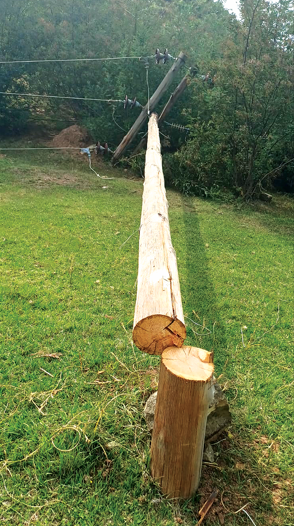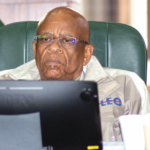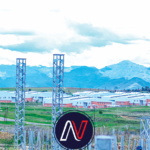- Roma Valley grapples with power infrastructure vandalism
Electricity poles lay toppled on the ground, their severed bases bearing stark evidence of yet another brazen act of self-sabotage.
On October 17, 2025, unknown vandals struck the Tloutle village, cutting down poles supporting 11kV transmission lines, thereby plunging homes across parts of the Roma Valley into an unscheduled power blackout.
When community members gathered at Tloutle Primary School grounds this week, along with officials from the Lesotho Electricity Company (LEC) and police shortly in the aftermath of the incident, the conversation turned confrontational.
Should entire villages pay for the crimes of a few? Is disconnecting power the answer? And could this vandalism be about more than just common theft?
The October 17 incident did more than disrupt power, it created immediate danger as high-voltage cables fell to the ground, coming into contact with trees and shrubs that burst into flames upon electrocution.
While fortunately no people or livestock were harmed, residents were left shaken by how close the community came to tragedy, by the time LEC officials switched off the power.
“It is such a miserable feeling to be without power, as we had to go back to the old way of living, such as using candles and lamps to light our homes. It is a painful reminder of the past,” said one villager, ‘Malehlohonolo Matekane, capturing the sense of regression that accompanies a blackout.
Ben Ntlaba, another Tloutle villager, said the stakes are even higher. He described vandalism as attempted murder, pointing to vulnerable residents dependent on electrically-powered medical equipment.
“There are people who are on life support machines powered by electricity, and the abrupt cutting of power is tantamount to attempting to murder them,” Ntšaba argued.
This was not the area’s first encounter with electricity infrastructure vandalism. A few years earlier, the area experienced similar attacks where the poles were cut and burned.
The pattern of repeat offences has led authorities and LEC officials to consider drastic measures to break the cycle.
At the public gathering, which drew residents from at least five villages in the Roma valley area, one suggestion stood out. Senior Inspector Maseli Maseli, a member of the Lesotho Mounted Police Service (LMPS) team attached to LEC, suggested hitting villagers where it hurts most, in their pockets.
“Maybe all villagers affected by vandalism must be asked to contribute money to replace the vandalised infrastructure to restore power connection, instead of the cost being shouldered by LEC alone,” Maseli said.
The rationale behind this controversial proposal is simple: if communities bear the financial pain of vandalism, they might be more motivated to identify and report suspects hiding in their midst. The only problem is that such a collective punishment risks unfairly penalising the innocent alongside the guilty.
He warned that vandalism of electricity infrastructure is a serious crime punishable by up to 20 years imprisonment under the Penal Code Act. He encouraged the public to use their power of citizens’ arrest to rid themselves of criminals terrorising the area.
Other suggestions at the gathering were equally severe. Some proposed that LEC disconnect the area from power for an extended period to sensitise villagers about the seriousness of vandalism. Officials pointed to Quthing, where residents have endured up to six months without power due to persistent vandalism in their area.
The most extreme proposal involved unleashing the army. However, this suggestion drew negative reactions, with some villagers recalling the horror of the last time soldiers were deployed to the area.
Some residents were allegedly left permanently maimed from rough treatment by security forces, creating lingering trauma that makes some community members wary of inviting such measures again.
LEC sees each vandalism incident as representing more than just damaged equipment, but as triggering a chain of unbudgeted expenses that ultimately affect all electricity consumers across the country.
Thamae Ngaka, from LEC’s public relations department, explained that vandalism is a serious problem for their operations.
“When it happens, LEC has to abandon some of its planned activities and devote financial and other resources towards replacing the vandalised infrastructure for the affected communities to have power back on,” Ngaka said.
“And when we restore the vandalised infrastructure, we often do that off budget because vandalism is not normally budgeted for,” Ngaka added, explaining that these unforeseen costs ultimately find their way into annual electricity tariff increases.
With the current rate of vandalism around the country, which includes cable theft and meter tampering, the problem is estimated to have cost LEC in excess of M10 million over the past financial year.
Ngaka warned that vandalism could account for a larger portion of power tariffs going forward, meaning all Basotho would increasingly subsidise the criminal acts of a few.
“Let this be the last time this is happening, or we will be forced to take drastic measures to find back,” Ngaka warned.
The representatives of the Roma Police Station, highlighted another troubling dimension of power infrastructure vandalism, which is creating conducive conditions for other forms of crime to flourish, in reference of the possibility of the suggestion to cut off power.
The link between darkness and increased criminal activity is well documented. Without street lights and with homes unable to maintain security systems or adequate lighting, communities become more vulnerable to burglary, assault, and other offenses that criminals can commit under cover of darkness.
While most assume vandalism is motivated by opportunistic theft, wooden poles for various household uses and copper cables for scrap metal sales, some Roma Valley residents suspect something more complex may be at play.
Speaking off the record to this publication, some villagers suggested that the persistent vandalism could carry a deeper meaning than just common stealing for household use.
They speculated it might be a subtle complaint about poor governance and management of LEC, which has been prominently featured in news reports over the past several months.
Their suspicion is not without foundation. The parliamentary Public Accounts Committee (PAC) has unearthed shocking mismanagement and misuse of finances at the power utility in recent months, painting a picture of an institution in deep crisis.
According to recent official reports, LEC faces near-bankruptcy, with liabilities spiralling into millions of maloti. Acting Minister of Energy, Mohlomi Moleko, has attributed LEC’s financial difficulties to alleged gross financial mismanagement, governance failures, and low energy tariffs.
The government recently injected M300 million to enable the company to continue purchasing electricity from South Africa’s Eskom and Mozambique’s EDM.
In March 2025, LEC’s Board of Directors suspended the entire executive management team for three months to facilitate an independent forensic audit into procurement processes, financial management, and operational inefficiencies.
Minister Moleko also addressed allegations of unfair labour practices within LEC, including wrongful dismissals, prolonged disciplinary hearings, and favouritism in hiring. He claimed that the company had been “captured” by politicians.
The PAC’s ongoing investigation has revealed troubling details about contracts with politically connected vendors, duplicate accounting entries, and an institutional culture that the new board, appointed in late 2024, described as toxic and dysfunctional when they took office.
Summary
- When community members gathered at Tloutle Primary School grounds this week, along with officials from the Lesotho Electricity Company (LEC) and police shortly in the aftermath of the incident, the conversation turned confrontational.
- “It is such a miserable feeling to be without power, as we had to go back to the old way of living, such as using candles and lamps to light our homes.
- It is a painful reminder of the past,” said one villager, ‘Malehlohonolo Matekane, capturing the sense of regression that accompanies a blackout.










